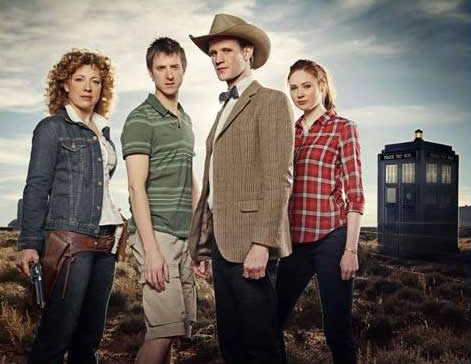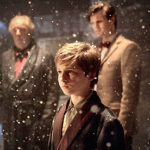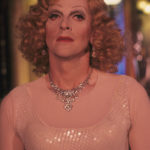The Doctor’s Doctrines: Discussion Time
 Almost every Speculative Faith post in the past several weeks has led to at least one Doctor Who reference or mention.
Almost every Speculative Faith post in the past several weeks has led to at least one Doctor Who reference or mention.
Methinks we can take the hint: our readers need to get it out of their system!
Why’s that? Perhaps because Doctor Who is the perfect storm of storytelling: brazen, complicated yet simple, with traditional elements yet edgy boundary-pushing, sci-fi and fantasy, epic yet personal, all those paradoxes even before the wibbly-wobbly, timey-wimey stuff gets started.
Current showrunner Steven Moffat under the previous showrunner’s five-year tenure won acclaim for his scripts of The Empty Child / The Doctor Dances, Blink, and Silence in the Library / The Forests of the Dead, and now he’s rebooted the show’s universe at least partially, at least twice. He’s a planner, that one. Chronic outliner, it would seem. Likes to play with time-travel and twists, on a large scale — his River Song and now The Silence story arcs — and on a small scale — daring to get the Doctor out of impossible situations with deus ex machina time paradoxes that actually work simply because of the show’s story-world rules.
This week I finally figured out who Moffat as storyteller reminds me of: parents who gleefully tell their children that Santa will come in the morning. His enthusiasm, explicit in interviews and implicit in the stories he shares, is contagious.
Now, after 40 years of obscurity, Doctor Who is crazy popular. It has dedicated fans, cosplay, insipid internet memes and everything.
Last Saturday, the revived British programme’s sixth series ended, and answered pretty much every question I could think of, going back to series 4, actually. For those of you disappointed with the Lost finale, Doctor Who actually brings story “payoffs.” No “it was just a dream” stuff. A spoiler-free review:
Who is River Song?
Already answered, almost all the way, it seems.
How did the Doctor escape his own clear death in series 6, episode 1?
Rather simple, actually, and one could say it was a big cheat if we had not been trained from previous series to expect giant complicated conclusions. Also, Moffat lied, rather overtly, claiming it was absolutely the Doctor himself who died a proper death. In fairness, Moffat also admitted he’d be willing to lie about secret plot points.
What happens next?
Since 2005, the finales had been getting bigger and bigger, to the point of exhaustion. In order:
- The Doctor saves future Earth from Daleks.
- The Doctor saves current Earth from Daleks and Cybermen.
- The Doctor saves current Earth from The Master and mutated invading humanoids from the future, in a later-aborted timeline.
- The Doctor saves the entire blinkin’ universe and parallel universes from a “reality bomb” made by Daleks and their creator.
- The Doctor saves contemporary Earth again, from the Master and his own long-lost race, the Time Lords, who were trying to escape their predestined doom.
- The Doctor saves the entire universe and parallel universes again, not only from a this-point-forward wipeout, but an explosion in time/space itself that would stop everything from ever having existed.
- The Doctor saves pretty much the entire universe yet again, from a similar crisis caused when someone tries to thwart a predestined event: the Doctor’s own (seeming) death.
But now the series 6 resolution moves Doctor Who in a new direction. Instead of being pretty much at the center of all known universes all the time, the Doctor, and his friends, can lapse into obscurity — not to us, of course, but in the story-world. I still remember in series 1 when the Doctor handed someone a computer disc with a program that would erase all rumors about him from the Internet. At that point, the Doctor would still prefer remaining in the shadows.
Later, though, he must have given up. Everyone in the universe became aware of the Doctor and his world-saving habits.
Now Moffat seems to want to go back to that in-the-shadows setup. The Doctor had been Superman, flying around in a colorful cape and flagrantly catching planes and lifting buildings and smashing up erupting volcanoes. Now it seems he’ll be much more like Batman.
There. “Previously on …”-style summary over. Discuss, quote, talk with fake British accents, and of course apply the Doctor-ish catchphrases of your choice. Reviews? Critiques? Anticipations?










































I’m going to stretch here and say something unseemly as the comparisons between the Doctor and Christ can be made, albeit weakly. But, it is interesting that the Doctor saved mankind with a bride. Jesus’ bride is the church. I don’t think this is in anyway intentional but it is interesting.
Yes….. m I loved that part. I loved the whole last half for that reason, I think.
SPOILERS
“Let’s Kill Hitler” episode– It’s his kindness that brings her transformation, just as God’s “kindness leads us to repentance.”
“The Wedding of River Song” episode— “I want you to know that you are forgiven, always and completely.”
One of my criticisms has always been the humanistic nature of the show, but I swear the last half of the season practically flipped that criticism on its head.
PS – Like I said, I gave you plenty of warning before I posted. If you read this, and you haven ‘t seen those two episodes, it was your own peril. 😛
There are so many thoughts in this show, from season 5 onward (where I started really watching, apologies to Tennant–I’ll watch the rest of your seasons someday!) that it does boggle the mind.
Remember the episodes with The Flesh in the first half of season 6? My mom noticed something that I had not. In the scene where they find the discarded doppelgangers all mashed into a pile, suffering and yet still alive, my mom was busy with something else, not really watching. But she was listening, and she said that the sound effects are of babies crying. She said it was a subtle message about abortion and how wrong it is. Anybody else catch on to that one?
Also, we’re setting up for the end of Matt Smith’s run. “The fields of Trenzalor, the fall of the Eleventh and the Question.”
Don’t bring that boogeyman up yet. Matt Smith is my Doctor: season six has put me through the wringer for him. I can’t bear to think of him being replaced yet.
Nooooo, Eleven is my Doctor too and I don’t want him to go away. 🙂
Kessie: though I don’t recall the sounds in that scene, I did note the parallels.
Any time a story, especially sci-fi, explores cavalier attitudes toward human life, treating it as disposable or subservient to “stronger” humans, such a story echoes truth about the sanctity of life. Whether Doctor Who‘s writers meant that by this episode is different, but they do so despite motivations!
*attempts to hold back SQEE! moment*
I’ve done more than my share of promoting the Doctor on this site. I really liked the just-ended series, and as Kaci pointed out, the messages in 6b were really strong morally.
Since I started watching last fall with season five, I had a really strong connection to both Amy and Eleven: Amy’s my first companiion (although not my favorite), and Eleven is my Doctor–so a lot of the tearjerkers were extra painful:
The Doctor’s death in IA. Didn’t help either that Elisabeth Sladen (who played Sarah Jane Smith, my favorite companion) had died four days before it aired.
The Idris/Doctor scenes in The Doctor’s Wife
“Guilt….guilt…also guilt…” The TARDIS interface in Let’s Kill Hitler
“Don’t run when you’re scared,” Let’s Kill Hitler
“I really am just a madman in a box.” Amy’s room and goodbye, The God Complex
“I can’t let you die without knowing you are loved.” River’s speech on the pyramid, Wedding of River Song…
And what I kept noticing over the course of this season is how helpless the Doctor is, how he is reduced to saying “sorry” so many times, because he can’t do anything else. I thought Ten was the apologizer, but Eleven is having just as much trouble. Even his companions’ faith in him is being twisted–and because he’s my Doctor and Amy’s my first companion, I’m recognizing it along with them. And, Rassilion, it hurts.
Which scene is the “Don’t run when you’re scared” one? I don’t remember that. Then, half those lines came so fast….
I believe it’s the one after Amy and Rory throw the Tesellecta (sp?) crew into chaos, and they need saving. River has been let free, and looked like she was going to run, and the Doctor begged her to save Amy & Rory… I think that’s where it is, near the start of the scene.
I have a link now http://youtu.be/JqmGzQ95MFE?t=9h29m18s
While others may have become Who fans long before even the revived series — going back to the “classic” serials, from the First to the Eighth Doctors — I got on board with the Ninth Doctor. (However, I started from the start of Series 1, while Series 3 with the current Tenth Doctor was on television.)
So to me, the Ninth Doctor (Christopher Eccleston) is still “my” Doctor. 😀
Behold fan art by yours truly, illustrating this fandom:
(I’m late to this party, I know, but I’ll make it good anyway. XD)
Has anyone heard things about the 2011 Christmas special? I had heard a fairly strong rumour that it was going to be based on LWW. (I’m not sure whether to term it a rumour or not, because it didn’t have a direct quote from Moffat but it also was on a fairly reliable news source… **shrug**) Which could be quite interesting!
I’m seeing some plot holes that I am kinda disappointed with but hopefully next series we’ll get an explanation for some of them?
I’ve heard that too-Doctor Who TV Uk site by any chance?
I forget. Let me check. Yup, that’s the place. The one that Narniaweb reported on anyway. (I don’t know if it’s elsewhere) The BBC press release and Moffat’s comments don’t mention anything of the sort but it was kinda short anyway…
I think it would be pretty cool if Moffat wrote the next Narnia film (whatever I think of his tendency to leave questions unanswered, I think with source material it would be very good) — so a LWW-inspired DW episode would be wonderful fun.
Again, if it’s true.
But after the brilliance that is A Christmas Carol, I’m hoping for something just as good. XD
And a quick lookaround on the internet (wikipedia) shows another UK site (Metro.co.uk) that says so… but not an actual quote. No reference. Hmm.
That site is pretty good with rumors: I mean it acknowledges that they’re rumors, but it still has theme and tries to back them up when possible. That’s where I got the first wiff of Amy’s pregnancy, for example…
So how real do you think this one is?
I’m banking on it. Cause how AMAZING would that be?
Well, we have an answer now, don’t we.
Yes, we do! I am quite happy. 😀
Also, as far as Moffat and Narnia goes=I think he’d be great with Silver Chair or Last Battle, but not as good with Magician’s Nephew or Horse and His Boy
Exactly. HHB is already a very good film story on its own, pretty much anybody with some sense could write it and it’d be good. XD
LB would be pretty epic Moffat-style. This I could see.
I’m wishing he’d have gotten to do PC. (But then my new post-DW-obsession rant about the Narnia films is how un-British they feel sometimes and I just want a real British writer… XD)
Darkness, falling stars, something that’s bigger on the inside, visiting legendary heroes….
Yep, sounds like a Moffat yarn.
Bit late, but I gotta say, the portrayal of mercy/redemption in “Let’s Kill Hitler” was mindblowing. Not that it happened, ’cause it’s so the Doctor to offer mercy. It’s how.
Melody poisons the Doctor. He’s dying. Then the Tessellactor swoops in and starts torturing her as punishment. The Doctor demands that they not lay a finger on her. When they point out the obvious, that she is the woman who kills the Doctor, his reply goes like this: “And I’m the Doctor, so what is that to you?”
While he is dying from her poison.
I doubt it was Moffat’s intent, but you know how Scripture goes on about how our sins are against God, first and foremost? David’s Psalm after he lost his infant son because of his adultery and murder over Bathsheeba was that he had sinned against God alone. As weird as that may seem, if we really believe that, this is what that looks like.
The Doctor’s objection to the Tessellactor is this: “Her sin is against me, not you. Therefore, since I have decided to be merciful, who are you to say otherwise?” And I’m thinking of how Satan is the Accuser of the Brethren, how he’s always telling us (and telling God) how we’re scum and worthless and sinful and all the horrible things we’ve done, and what does God say? “Their sin is against Me, not you. I’ve forgiven it, who are you to say otherwise?”
So yeah. After I picked my jaw up off the floor, I marveled at how an atheist beat me at theology again. But then, all truth is God’s truth.